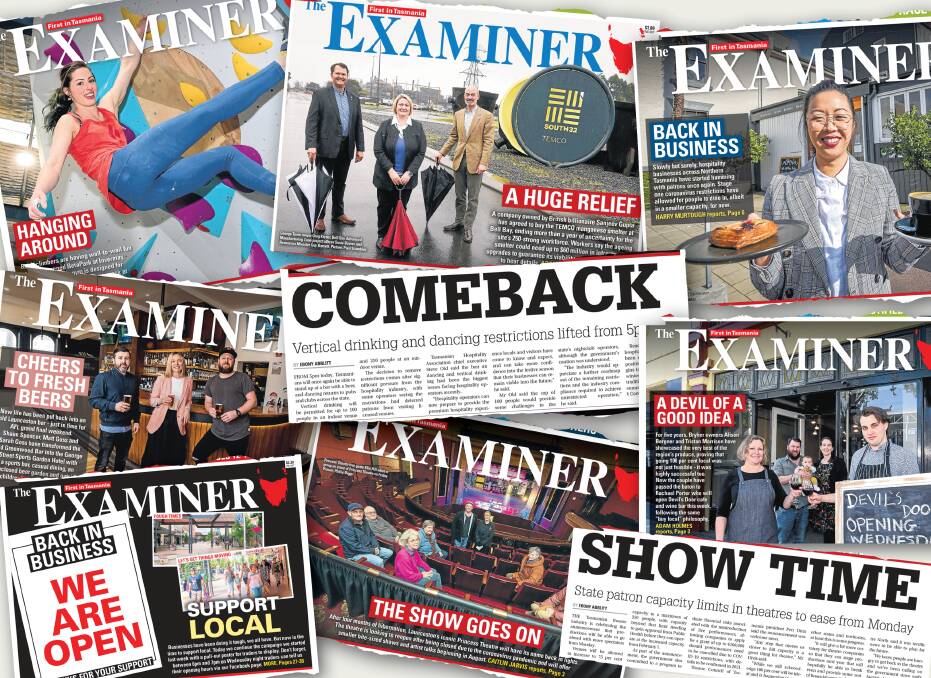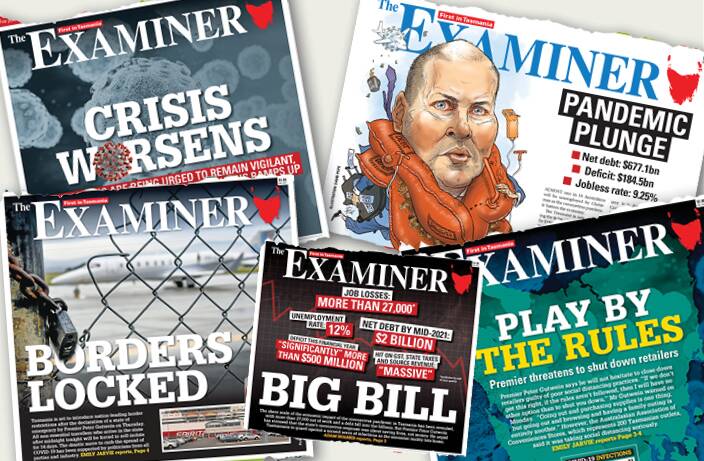
There's no doubt that 2020 caused significant challenges and stress to the state's business community.
Subscribe now for unlimited access.
$0/
(min cost $0)
or signup to continue reading
The COVID-19 pandemic brought harsh restrictions for businesses, trade routes and significant economic challenges.
As 2021 begins, business reporter EBONY ABBLITT spoke with key leaders across the sector about the year that was, and their hopes for 2021.
CHALLENGING YEAR
Tasmanian Hospitality Association chief executive Steve Old said last year was one of the most challenging the hospitality industry had ever faced.
"The COVID-19 pandemic impacted every Tasmanian and every Tasmanian venue," he said.
"The forced closures of venues back in March plunged the sector into a state of uncertainty that is still ongoing.
"Among the biggest struggles were the ongoing restrictions imposed on the industry and the uncertainty and frustration this caused."
Small Business Council chief executive Robert Mallett said one of the biggest challenges of 2020 was meeting the needs of all small businesses as a result of lockdowns and border closures.
"Many of them are doing well now, yet the sadness we feel individually and collectively for the hospitality sector is wrenching," he said.
A highlight during the immense challenges faced was the community support - both in industry and by the greater public.
Northern Tasmanian Development Corporation chief executive Mark Baker described the past 12 months as "a disrupted and, for some, dispiriting year".
"The need to react to the very real health crisis created an economic crisis for many people and businesses, particularly those in travel, hospitality, and tourism," he said.
"However, we saw many of those industries move quickly to other operation and the community rally around them so that many were sandbagged from the full impact.
"For me, that was one of the highlights, if you can say that, of 2020.
"There was an enormous sense of community goodwill, collaboration and support in Northern Tasmania. We got out there very early and shopped locally and we spent a little extra if we were able to."
There was an enormous sense of community goodwill, collaboration and support in Northern Tasmania. We got out there very early and shopped locally and we spent a little extra if we were able to.
- Mark Baker
Government support, including state government grants and federal government programs like JobKeeper also highlighted as keeping businesses afloat during challenging times.
Mr Mallett said there was a lot of gratitude for leaders, both state and national, for having a bold plan for state support.
"The timeliness on which big decisions were made, the humility of the leaders in the distribution of their message, and the maturity of all the opposition parties in letting the government get on and govern appropriately in this time of crisis," he said.
MENTAL HEALTH
After a year where restrictions were imposed and isolation measures were put in place, it is no surprise that mental health concerns were highlighted as one of the biggest challenges.
"Mental health has been one of the biggest struggles of 2020 and hospitality operators and staff are certainly not alone in those struggles," Mr Old said.
"Hospitality staff have been forced to impose these restrictions for more than seven months, often with significant reaction from patrons, and for some, this has further impacted their mental health."
Government projects, including more funding for services like Lifeline, have assisted with easing the burden mental health has placed on many. Industry has also stepped up to help.
"The THA is proud to have launched a mental health resource which assists those struggling or those wanting to help someone who is struggling to access the help they need," Mr Old said.
The NTDC wants to see mental health as an area for development in 2021.
"While mental health might sound an unlikely area for an economic development body to be interested in, the reality is the need for better mental health support in the workplace before it becomes a clinical issue is vital," Mr Baker said.
"Absenteeism and presenteeism costs the Australian economy billions of dollars in lost productivity each year and we need to address the latent demand for support that will exist in many workplaces."

ROAD AHEAD
Industry support has been highlighted as critical moving forward, as the state continues to work through the challenges faced by COVID-19 related disruptions.
Launceston Chamber of Commerce chief executive David Peach said we aren't out of the "economic woods" yet.
"In contrast to those businesses doing well, there are many businesses in the events and tourism-based sectors that really need a good summer to bounce back after a tough year and depleting of cash reserves over the winter," he said.
"From a business perspective, it feels as though some businesses are in better shape than they were this time last year. There's still a lot of cash sloshing around the economy from government stimulus, but that begins to taper off in the new year.
"We're urging businesses that can do so, to prepare for tougher times ahead by saving."
Mr Mallett said he would like to see businesses build on the strengths they gained from navigating the pandemic.
"We'd like to see all employers build on the relationships they have developed with their staff as a result of the shared crisis," he said.
FOCUS AREAS
All leaders agreed that the main area of focus for 2021 would be recovery, with collaboration to play a huge part.
"Our focus for 2021 is helping the industry to get back on their feet as quick as possible," Mr Old said.
"We know that this summer will not be as gainful as previous years, and we will continue to help members with the ongoing challenges to ensure they can survive through the quieter winter months and through to a more viable second half of this year.
"We have some wonderful people in the industry providing some amazing experiences, so we look forward to sharing some of these stories to recognise the important part they play in bringing the community together and making Tasmania the premium destination it is."
"NTDC will continue to focus on supporting our members and working on projects and ideas that will aid in the social and economic recovery of Northern Tasmania," Mr Baker said.
"I firmly believe our competitor is not the business, organisation or council around the corner, it is the business, organisation and council around the world that we must compete with.
"When you compete, you look for competitive advantages; the things you do better than other places, and Tasmania has many of those advantages so focusing on our regional assets and how we can maximise their recovery will be vital."
Visit Northern Tasmania chief executive Chris Griffin said there will be a strong focus on the future.
"We'll be looking to evolve our events calendar and build new experiences for visitors such as agri-tourism," he said.
"We'll be champion local destination strengths such as heritage, mountain biking, short walks, fly fishing and yes even boutique cruise ship visits returning to the Tamar Valley.
"What we'll need to help is a joint effort by all partners and a whole lot of that resolve and adaptiveness we learnt through 2020 kicking into gear for the right reasons."
Mr Peach said the key driver for the Chamber in 2021 will be collaboration.
"The Regional Collaboration Framework being advocated by NTDC has its origins within the Launceston Chamber of Commerce and we are 100 per cent supportive of it," he said.
"We see regional collaboration on three fronts as essential for Northern Tasmania and this vision will inform all of what we do."
LESSONS LEARNT
The past year has taught valuable lessons across the industry sectors, including how unpredictable events can impact in moments.
Measures are being put in place to continue planning beyond 2021 and into the future.
The THA brought in their 'Welcome Back' tour late in 2020 to connect with regional venues across the state. They have committed to making it an annual event to drive patronage.
The NTDC will continue to drive circular economy initiatives and sees the green hydrogen potential in Northern Tasmania to be a "gamechanger".
The government's approach to renewable energy is something that the Launceston Chamber of Commerce is "excited" by, playing to Launceston's goal of becoming one of the "great regional cities of the world."
Visit Northern Tasmania will be looking to the past - championing heritage tourism.
"Too long we have been complacent with regard to the needs of our major heritage sites," Mr Griffin said.
"These cash-cows of the tourism industry in the 20th century have real potential to become the epi-centre of contemporary Tasmanian story-telling that will entice visitors back to our island."
The Small Business Council is looking forward to a measured return to safe national and targeted international travel to continue boosting the economy.
WHAT'S UNDERWAY
In November, the City of Launceston approved a record number of planning applications.
As restrictions eased, business reopened, people rallied to support local - and new ventures began to launch.
Premier Peter Gutwein said nearly three-quarters of Tasmanians have returned to work since May.
"Our unemployment rate continues to fall, and our participation rate continues to increase, as more workers return to the workforce," he said.
"My focus in the new year will be to get even more Tasmanians back into work and to create more jobs for Tasmanians.
"The 2020-21 Budget is all about jobs, confidence and community, and delivers a landmark $5 billion infrastructure to support 25,000 jobs and deliver the intergenerational infrastructure our community needs."
What do you think? Send us a letter to the editor:

